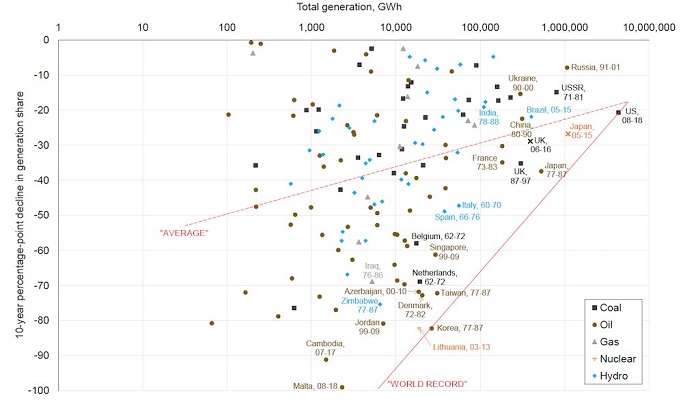11 Dec 2024

Tired Earth
By The Editorial Board

Limiting how much coal countries can burn is considered an urgent priority for restraining global heating. After all, coal is the most carbon-rich of all fossil fuels and its combustion has contributed the most to planetary warming. For the first time in international talks, negotiators agreed to "phase down" coal use to prevent global temperature rise exceeding 1.5°C in the 2021 Glasgow Climate Pact.
Coal's primacy in climate negotiations is partly because of the Intergovernmental Panel on Climate Change (IPCC), which has devised pathways to halting warming at 1.5°C. These scientific assessments prioritize the rapid phasing out of coal burning not only for the fuel's carbon intensity and the need to head off CO₂ accumulation in the atmosphere, but also to encourage the availability of cost-competitive alternatives in the form of solar and wind farms.
Researchers also stress the importance of decarbonizing the power sector early in the green transition to enable other sectors, such as transport and industry, to run on clean electricity from the grid.
This puts the onus on certain nations to reduce emissions faster than others. The majority of global coal use can be found in emerging and developing countries, such as China and India. Here, large fleets of power stations and factories rely on coal which is cheap and abundant compared to other fossil fuels. By framing the solution to climate change as one in which coal is removed first, it is these countries that must commit to rapidly decarbonizing in the next decade.
In our new paper published in Nature Climate Change, we highlight two problems with most published pathways to avoiding catastrophic climate change. First, it is unlikely that coal-dependent countries will be able to ditch the fuel as rapidly as these pathways set out.
And second, as this is the case, other fossil fuels, namely oil and gas, must be phased out more rapidly to compensate for coal's slower exit. This would shift responsibility for mitigating climate change towards developed countries.
The speed limit on phasing out coal
We compared how much coal use is expected to fall in modeled pathways to 1.5°C with the fastest power transitions that have taken place over the last 50 years, with all fuels and in all countries.
These transitions are shown in the figure below, and reflect a range of drivers, such as policy responses to the 1970s oil price crisis and political events such as wars, sanctions and the collapse of the Soviet Union. The red line labeled "world record" indicates the fastest pace that could be feasible with the political will to enact ambitious policies.

Based on modeled pathways from the IPCC, we estimate that coal power will have to be phased out in India, China and South Africa more than twice as fast as any historical power transition for electricity systems of comparable size. This is unlikely to be achievable or acceptable in any major coal-dependent developing country.
A more feasible pathway to eliminating coal might use the targets set out by the Powering Past Coal Alliance (PPCA), an international coalition of countries established in 2017. The PPCA favor a differentiated timeline for exiting coal power, with rich countries going first by 2030 and the rest of the world by 2050.
These targets reflect how developing countries are more dependent on coal and have less money to invest in the green transition, but bear less historical responsibility for causing climate change.
This differentiated pace would put several countries, including China, at the speed limit of historical transitions. In other words, it would offer them a pathway to decarbonization that is difficult, but possible. This trajectory would see developed countries reducing carbon emissions roughly 50% faster compared to pathways without the fairer distribution of efforts proposed by the PPCA.
This inverts the narrative from successive climate summits: developed, not developing, countries are the ones that must do more in the short-term to limit warming.
It also has important consequences for oil and gas. In all countries, oil and gas production must fall even in published pathways to 1.5°C, rather than increasing as most countries plan.
But when the world phases out coal at the PPCA pace, oil and gas must be phased out correspondingly faster. This has a different impact on different countries. For example, cumulative oil production by the US from 2020 to 2050 is 20% lower than in a 1.5°C pathway without the differentiated efforts proposed by the PPCA.
Limiting climate change requires phasing out all three fossil fuels: coal, oil and gas. Our research finds that climate models and policy debates rely too much on winding down coal, especially in coal-dependent developing countries.
Instead, a fairer and more realistic balance of mitigation efforts is needed, which means more emphasis on eliminating oil and gas. It also means greater effort by the global north, even while all countries, including those in the global south, end coal power as quickly as possible.
Source : phys.org
Comment